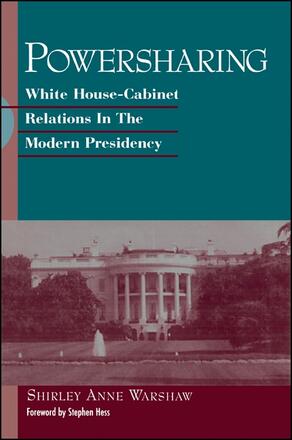
Powersharing
White House-Cabinet Relations in the Modern Presidency
Alternative formats available from:
This study of presidential administrations from Nixon through Clinton discusses how and why the White House has become the dominant player in the domestic policy process, relegating the departments to implementation, rather than design, of key initiatives.
Description
The complex relationship between the White House staff and the presidential cabinet has changed dramatically in the last 25 years. During that time, the White House has emerged as the center of power in the domestic policy process, leaving the departments with a diminishing role in initiating major policy proposals. This book focuses on powersharing between the White House and the cabinet in the policy process and examines how and why the White House has become the dominant player, relegating the departments to implementation, rather than design, of key initiatives.
Powersharing begins with an overview of the role of the modern cabinet and a discussion of the cabinet's emergence in a policy role, and then in a chapter-by-chapter analysis of presidential administrations from Nixon through Clinton chronicles the shifting balance of power from the departments to the White House in both the design and management of the nation's major domestic programs. The book concludes with an assessment of the prospects for effective powersharing between the cabinet and the White House staff.
Shirley Anne Warshaw is Associate Professor of Political Science at Gettysburg College. Among her other publications are two edited volumes, Reexamining the Eisenhower Presidency and The Eisenhower Legacy.
Reviews
"Powersharing is a major study of cabinet-White House relations in the modern presidency. Professor Warshaw argues forcefully that presidents need a strong White House staff to manage the often conflicting goals of the departments and ensure a clear focus to the administration's agenda. Without that focus, departments will move in their own directions to satisfy the numerous demands on their own agendas." — from the Foreword by Stephen Hess
"Warshaw's book is quite distinctive for its breadth, depth, and analysis of cabinet-White House relations in the formulation of domestic policy. It fills an important need for a comprehensive assessment of the cabinet in the contemporary era. Warshaw has made good use of archival materials and interviews. Few scholars of the presidency have bothered to look at the role of the cabinet. Her book focuses on the post-Eisenhower era in a comprehensive and much-needed fashion." — Phillip G. Henderson, Catholic University of America